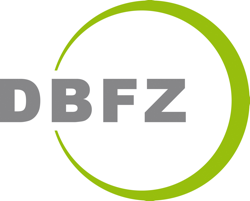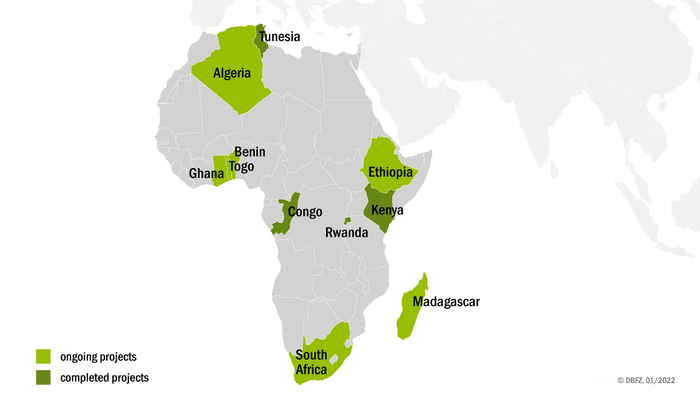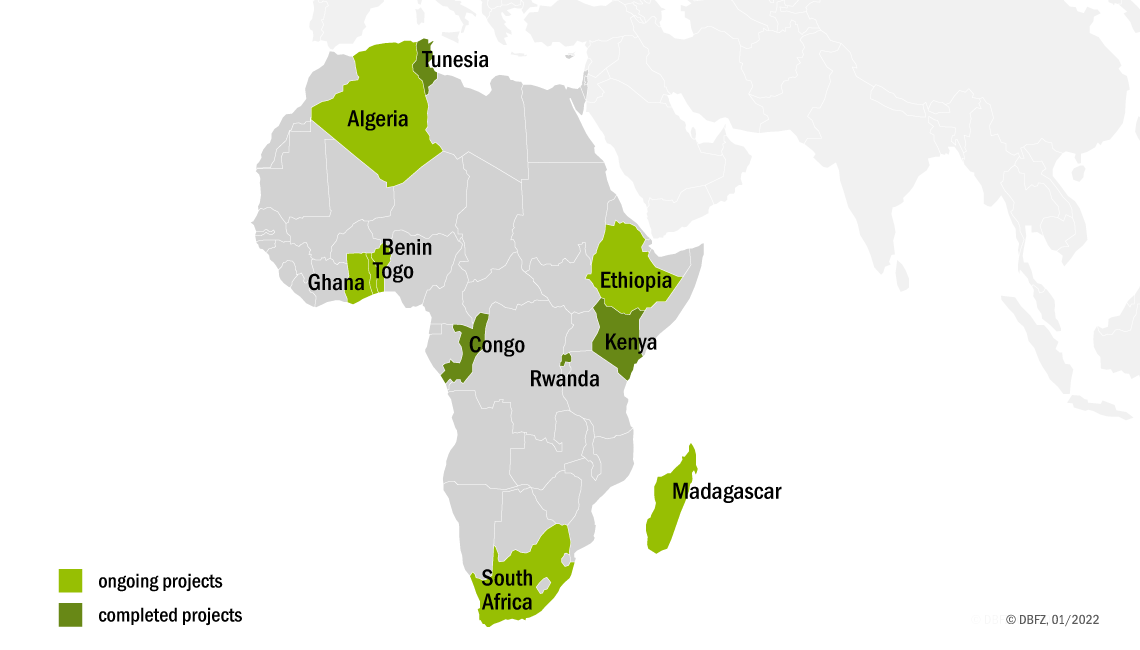Africa
Africa has shown a high rate of economic development in the last couple of years. Forecasts predict further growth, but also an increasing population in the 21st century. Consequently, energy demand is going to rise. Considering the reality of anthropogenic climate change and its consequences which will affect some African countries harder than other regions world-wide, fossil energies are no longer an alternative for energy provision. The good news is that the potential of renewable energies (PV, wind, hydro power – and biomass) in Africa is huge. But so are the challenges.
The case of bioenergy use illustrates some of them. Although there is a high theoretical potential for agricultural residues, these resources are often already in use as animal feed or treated in the traditional way (e.g. burning in the fields). At the same time, some countries have an alarming rate of deforestation. The wood is either directly used in three-stone fires or converted into charcoal. Both feedstocks fuel cooking devices all over the continent. Most people still rely on this traditional use of biomass. Modern bioenergy systems are scarce (and too expensive). The legal framework for renewable energies is often not comprehensive and conclusive in many countries leaving important gaps for potential investors. Frequently, there is lack of knowledge, research infrastructure and skilled man-power for operation and maintenance.
DBFZ will therefore continue to contribute to the further development of the bioenergy sector and the bioeconomy in Africa, taking into account the food security - energy - climate nexus. These activities include the implementation of specific pilot projects as a kind of demonstrator and multiplier, the adaptation of technologies and research. DBFZ will focus on transferring knowledge to universities, ministries, administrations, funding organizations, extension services, trainers, industry partners and local and regional stakeholders. In this way, DBFZ aims to support the promotion of a sustainable economic development and protect the climate at the same time.
Country experiences
DBFZ’s activities in Africa started 2012. A first milestone was an overview study on the continent’s biomass potential conducted for the International Renewable Energy Agency (IRENA) in 2013. In 2015, DBFZ developed a hybrid renewable energy plant based on a combination of biomass and PV energy in Algeria and Tunesia.
Starting in 2016, DBFZ has promoted the cooperation with South Africa. Several biogas projects were implemented, including the support for the setup of own research facilities and biogas laboratories in different universities in this country. In addition, DBFZ assisted to develop norms and standards for the organic waste treatment and to implement a standardized protocol for biogas substrates testing. Different biogas concepts were developed for Kenya, while Kenyan researchers underwent a training course at DBFZ.
For Namibia, biomass samples which originated from a de-bushing project were analyzed and characterized. DBFZ also carried out a life cycle assessment for the application of biochar to soils for Tunisia, Benin and Madagascar.
In Ghana, DBFZ implemented a comprehensive project to generate energy from organic waste. Following a potential analysis of agricultural residues suitable for bioenergy production at national, regional and local level, a pre-feasibility study was carried out for a biogas plant at a local site. Thereafter, a hybrid plant concept to provide energy from organic waste and from a PV plant was implemented.
In Togo, DBFZ started to set up a research biogas laboratory at the University of Lomé and to carry out the laboratory training required for operation in 2019. The overall project also included the design and development of a new type of cookstove (“Apeli” stove), which can be produced locally at very low cost and which has been tested in rural communities. In two follow-up projects starting in 2024, the focus was on knowledge transfer and training as well as adapting the technologies to local conditions and feedstocks.
In Ethiopia, DBFZ started a project in 2020 to develop a use concept for the organic fraction of household waste in Addis Ababa. One year later, the largest DBFZ project abroad began: ETH-Soil. The aim of the project has been to improve food security in three pilot regions in the regional state of Oromia through the application of biofertilisers on degraded soils. The biofertilizer derived from pyrolysis and biogas plants. In order to ensure the sustainability of the project modules for capacity building, education and training were implemented in different institutions.
Further information on the specific country experiences can be found in the Country reports (PDF):
Togo | South Africa | Ghana | Ethopia
The list will be extended successively.


